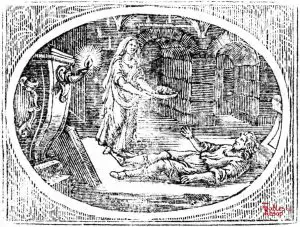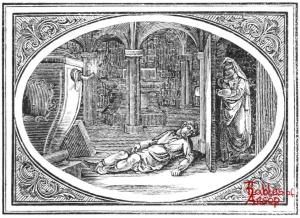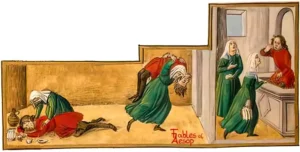A drunken Husband was taken to the morgue by his wife. She came back later but the Husband told her to go away unless she had drink for him.
It’s hard to give up bad habits.

JBR Collection
A certain woman had a Drunken Husband, whom she had tried in many ways to reclaim. It was all of no use. One night when he was brought home, as usual, quite unconscious, she bad him carried to a neighbouring tomb. Dressing herself in a weird costume. and with a mask upon her face, she awaited his return to his senses. Then, advancing in a solemn manner, she offered him some food, saying in a sepulchral tone, “Arise and eat. It is my office to bring food to the dead.” “Ah,” said he, “if you had known me better, you would have brought me something to drink instead.”

Samuel Croxall (The Drunken Husband)
A CERTAIN Woman had a drunken husband, whom when she had endeavoured to reclaim several ways, to no purpose, she tried this stratagem. When he was brought home one night, dead drunk, as it seems he frequently used to be, she ordered him to be carried to a buring place, and there laid in a vault, as if he had been dead indeed. Thus she left him, and went away, till she thought he might be come to himself, and grown sober again. When she returned and knocked at the door of the vault, the man cried out, Who’s there? I am the person, says she, in a dismal tone, that waits upon the dead folks, and I am come to bring you some victuals. Ah! good waiter, says he, let the victuals alone and bring me a little drink, I beseech thee. The Woman hearing this, fell a tearing her hair, and beating her braast in a woeful manner. Unhappy wretch that I am, says she; this was the only way that I could think of to reform the beastly sot; but instead of gaining my point, I am only convinced that this drunkenness is an incurable habit, which he intends to carry with him into the other world.
THE APPLICATION
This fable is intended to show us the prevalence of custom; and how, by using ourselves much to any evil practice, we may let it grow into such a habit as we may be never able to divest ourselves of. In any thing that we are sensible may be prejudicial to either our health or fortunes, we should take care not to let our inclinations run up into a habit: for though the former may be easily checked at our first setting out, and directed which way we please; yet the latter, like a head-strong, unruly horse in his full career, will have its own course, and we are hurried impetuously on, without the power of controling it. As the passions of young men are warm, and their imaginations lively, it would be wrong to endeavour to tie them up from the pursuit ot innocent pleasures. But those among them, that think at all, can never form a more useful and happy resolution, than not to suffer themselves to be drawn into a habit, even in indifferent and trifling things. He that keeps himself free from the slavery of habit, will always be at leisure to distinguish what is good for him, from that which is otherwise: and then there is no fear, but his cool, unbiassed judgment will direct him to such pursuits as will be least hurtful, if not most, useful to him.

Thomas Bewick (The Drunken Husband)
A certain Woman had a Drunken Husband, whom she had endeavoured to reclaim by several ways, without effect. She, at last, tried this stratagem: when he was brought home one night dead drunk, she ordered him to be carried to a burial-place, and there laid in a vault, as if he had been dead indeed. Thus she left him, and went away till she thought he might be come to himself, and grown sober again. When she returned, and knocked at the door of the vault, the man cried out, who’s there? I am the person, says she, in a dismal tone of voice, that waits upon the dead folks, and I am come to bring you some victuals. Ah, good waiter, says he, let the victuals alone and bring me a little drink, I beseech thee. The Woman hearing this, fell to tearing her hair, and beating her breast in a woeful manner: Unhappy wretch that I am, says she, this was the only way that I could think of to reform the beastly sot; but instead of gaining my point, I am only convinced that his drunkenness is an incurable habit, which he intends to carry with him into the other world.
APPLICATION.
This Fable is intended to shew us the prevalence of custom; and how by using ourselves to any evil practice, we may let it grow into such a habit as we shall never be able to divest ourselves of. “O! that men should put an enemy into their mouths to steal away their brains!” There is no vice which gains an ascendant over us more insensibly, or more incurably, than drunkenness: it takes root by degrees, and comes at length to be past both remedy and shame. Habitual drunkenness stupifies the senses, destroys the understanding, fills its votaries with diseases, and makes them incapable of business. It cuts short the thread of life, or brings on an early old age, besides the mischief it does in the mean time to a man’s family and affairs, and the scandal it brings upon himself: for a sot is one of the most despicable and disgusting characters in life. After he has destroyed his reasoning faculties, and thus shewn his ingratitude to the giver of them, be flies to palliatives as a remedy for the diseases which his intemperance has caused, and goes on in a course of taking whets and cordials, and more drink, till he falls a martyr to the vice, to which through life he has been a slave.

L’Estrange version
A woman that lay under the mortification of a fuddling husband, took him once when he was dead drunk; and had his body layd in a charnel-house. By the time that she thought he might be come to himself again, away goes she, and knocks at the door. Who’s there (says the toper). One, says the woman, that brings meat for the dead. Friend, says he, bring me drink rather. I wonder any body that knows me, should bring me one without t’other. Nay then, says she, the humour I perceive has taken possession of him; he has gotten a habit, and his case is desperate.
Moral
Inveterate ill habits become another nature to us, and we may almost as well be taken to pieces, and new put together again, as mended.

Gherardo Image from 1480

Uxor et Vir Ebrius
Cum mulier quaedam ebriosum virum haberet eumque ab hoc morbo liberare omnimodo vellet, huiusmodi astutiam excogitavit: ut somno eum ex ebrietate correptum sensusque expertem mortui ad instar aspexit, sublatum in humeros ad sepulcretum extulit, ibique deposito discessit. Cum vero eum expergefactum nec vino amplius gravem coniecit, ad sepulcretum reversa, fores eius pulsavit. Vir quis eas percuteret rogat, sed uxor, “Mortuis cibaria ferens, en adsum ego,” respondit. Cui ille, “Non mihi cibum, sed potum, O bone, potius affer; tristem enim me reddis, dum cibi, non potus mentionem facis.” Tunc coniunx, sibi manibus pectus percutiens, “Heu me miseram,” inquit, “quae ne hoc astu quidem nihil profui tibi! Nam tu, non modo emendatus non es, sed peior quoque temetipso evasisti.”
Perry #246


